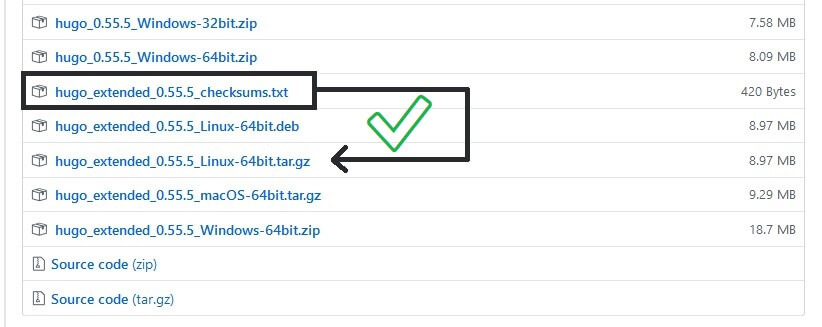Add HUGO to Docker build image

1. Introduction
Hugo is a static website generator written in Go and available across multiple platforms. Static site generators are a great choice for blogs and can replace server-side CMS like WordPress. As a matter of fact, this website is build with Hugo.
In this post, we will cover how to install, verify and use Hugo in a Docker build image. This will allow us to easily and reliably build the site on a Continuous Integration (CI) service like Gitlab CI, Travis CI or Circle CI.
2. Just show me the code
3. More information
3.1 So why are these 12 lines of Dockerfile code special?
Because we not only download, but also validate Hugo.
Furthermore, we manage this with only a single variable, namely HUGO_VERSION.
The following line is responsible to verify the provided checksum on Github with the actual sha256 hash of the downloaded archive e.g. hugo_extended_0.55.5_Linux-64bit.tar.gz.
grep " hugo_extended_${HUGO_VERSION}_Linux-64bit.tar.gz\$" hugo_extended_${HUGO_VERSION}_checksums.txt | sha256sum -c -

3.2 Prerequisites
The packages curl, tar, grep are required for this command to work.
If you’re building your Docker image upon common images like buildpack-deps, you will most likely have them installed.
FROM buildpack-deps:stretch
I’m using ubuntu:18.04 as base image and install curl manually:
FROM ubuntu:18.04
RUN set -ex \
&& apt-get update \
&& apt-get install -y --no-install-recommends \
ca-certificates \
curl \
&& rm -rf /var/lib/apt/lists/* \
&& apt-get clean
3.3 Hugo w/o Extended Version
Hugo provides binaries with and without an “extended” version.
The “extended” version essentially offers additional Sass/SCSS capabilities.
In my opinion, using the extended version of Hugo doesn’t really have disadvantages. But sometimes you don’t want/need the extended version.
In that case, simply remove all occurrences of _extended in the provided script.